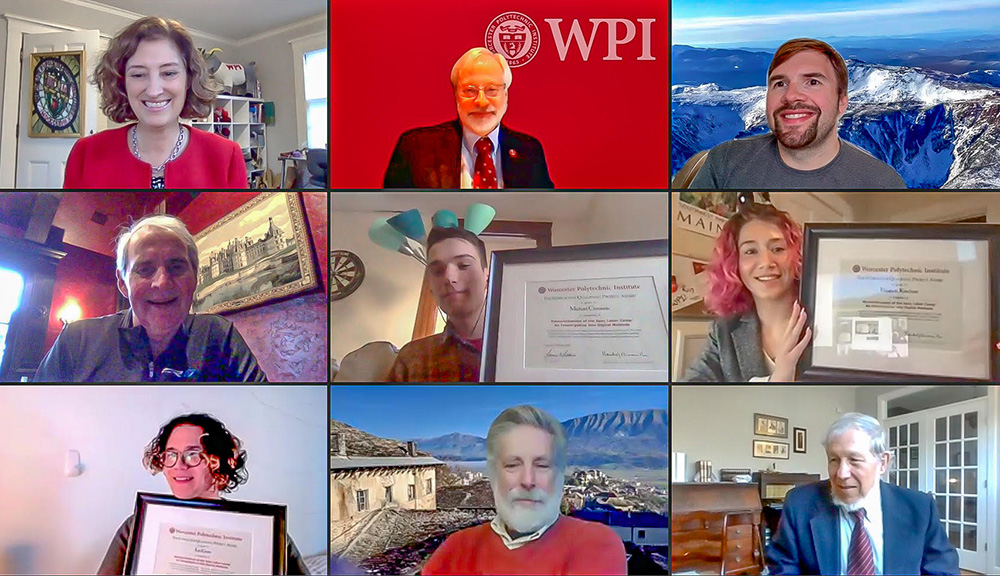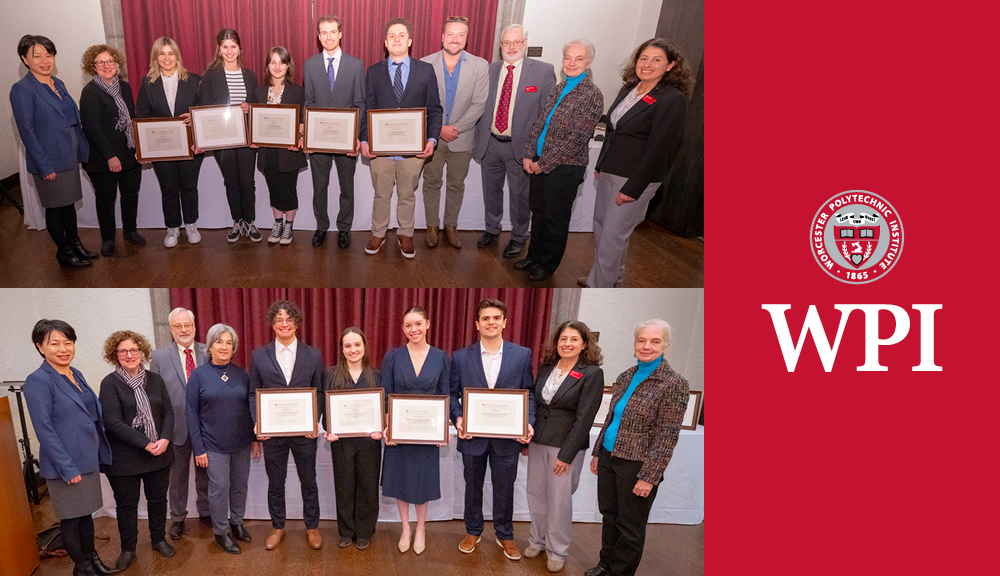WORCESTER, Mass. – Wind power, flood control, shrimp farming in Costa Rica, alternative energy in England, and improved hearing aid design. Worcester Polytechnic Institute (WPI) will recognize this month these and other WPI student research projects that have made a local – and global -- scientific and technological impact.
This year, 34 student teams submitted entries for the 2006-07 President’s Interactive Qualifying Project (IQP) Awards. Five student research projects were selected as finalists, and six were chosen to receive special commendation. The finalists will give presentations in Higgins Laboratories Room 116 at 1:45 p.m. on Wednesday, Jan. 31, to President Dennis Berkey and a judging panel, whose members include Peter Spotts, science reporter for the Christian Science Monitor, and Kathleen Stephens, principal deputy assistant secretary of the federal Bureau of East Asian and Pacific Affairs in Washington, D.C.
One of three projects required of all WPI undergraduates, the IQP encourages students, working in teams under the guidance of faculty advisors, to examine a problem at the intersection of science, technology, and society, locally, or at one of the more than 20 project centers WPI sponsors around the world. Since the beginning of the WPI Plan, the university’s project-enriched curriculum, in 1972, thousands of IQPs have been completed in cooperation with industry and private and public organizations.
Projects completed in Worcester and around the world, as part of WPI’s Global Projects Program, have made a difference to individuals, organizations, and agencies around the world. In Venice, students have helped reduce damage to canal walls and cataloged the city’s endangered public art. In Thailand, they have brought solar energy to remote tribes and assessed environmental threats facing residents of the Klong Toey slum. Projects in Boston have addressed a number of critical issues, from public safety to parking, that impact the quality of life for the city’s inhabitants and visitors. Locally, in Worcester, students have conducted an in-depth look at historic preservation and restoration projects in the city.
To be considered for the President’s IQP Award, projects must be superior in conception, execution, and presentation. The award consists of certificates of merit and honoraria for the students, and certificate of merit for the project advisor(s).
The 2006-07 finalists:
- “Wind Power Feasibility Study for Holy Name High School,” by Brian Foley, Tyler Forbes, Hans Jensen, and Adam Young; advisor: Alexander Emanuel.
- “Partnerships Implementing Engineering Education: 2nd and 3rd Grade Lessons,” by Cale Putnam, Jessica Rosewitz, Michelle Tucker, and Robert Weir; advisor: Jill Rulfs.
- “Erosion and Flood Control in Otjomuise,” by Nicole Labbe, Nicholas McBride, and Ethan Ray; advisors: Chrys Demetry and Rick Vaz.
- “Good Management Practices for Shrimp Farming in Costa Rica,” by Daniel Bryand, Andrea Kadilak, and Sandro Pani; advisors: David DiBiasio, Natalie Mello, and Guillermo Salazar.
- “Content Suggestions for Universally Designed Hearing Aids,” by Tim Buck, Kerri George, Jeremy Turner, and Nick Verlinden; advisors: Paul Davis and Kevin Clements.
- The following projects received special commendation:
- “Promotion of Hospice and Homecare Programs in Thailand: A Framework for the Assessment of Costs and Benefits,” by Katherine Kelly, Batsirai Mutetwa, and Lisa Novoson; advisors: Rob Krueger and Seth Tuler.
- “Harvesting He-3 on the Moon,” by Marsha R. D’Souza, Diana M. Otalvaro-Gutierrez, and Deep Singh; advisor: Nikolaos Kazantzis.
- “Evaluating Urban Alternative Energy Technologies for the Borough of Merton,” by William Caruso, Ashley Mossa, and Danielle Sorenson; advisors: Scott Jiusto and Rick Brown.
- “Interactive Learning Modules for the Royal Armouries Education Centre,” by Marc Bouchard, March Guillemette, Eric Mueller, and Sean O’Keefe; advisors: Scott Jiusto and Rick Brown.
- “Negotiating Secure Land Tenure Through Community Redevelopment: A Case Study From the Klong Toey Slum in Bangkok,” by Justin DiNino, Laurie Garabedian, Daniel Ossa, and Krista Smith; advisors: Rob Krueger and Seth Tuler.
- “Investigating Visual Instructions for Mechanical Exhibits at the Science Museum, London, UK,” by Kyle Flynn, Felix Geller, Katelyn LeBlanc, and Eugeny Sosnovsky; advisors: Mike Elmes and Steve Taylor.


